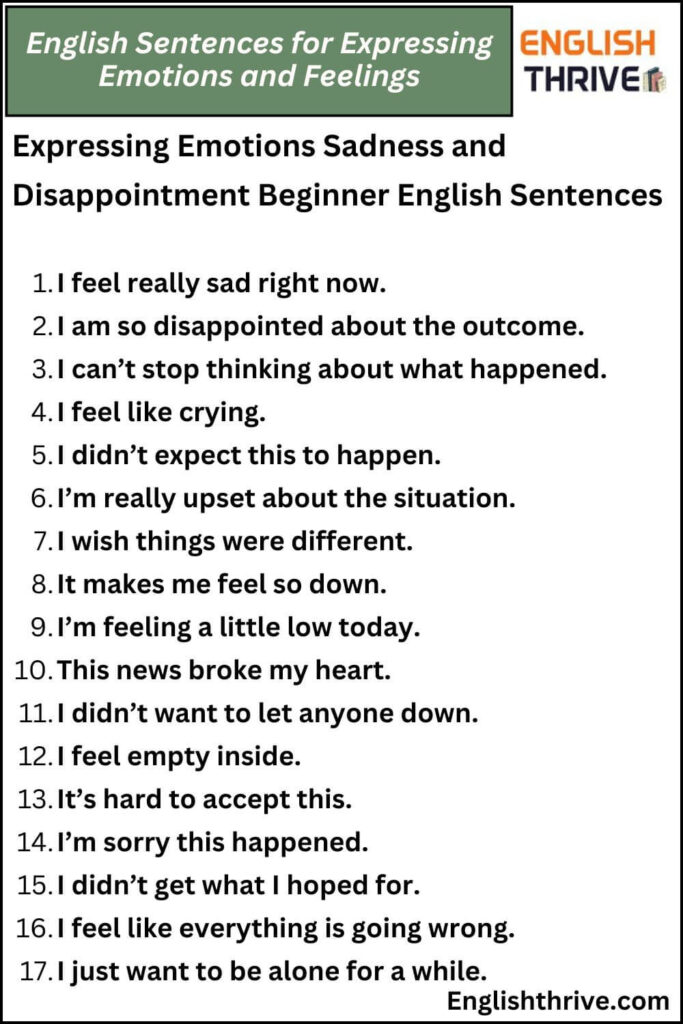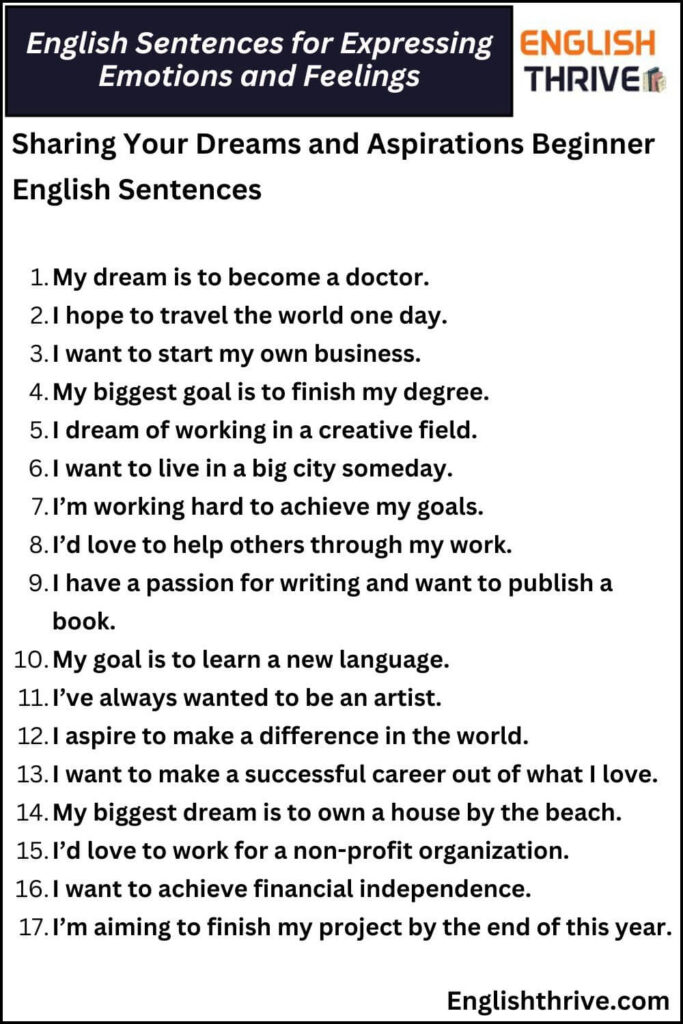Expressing Emotions and Feelings are an essential part of our everyday conversations, whether we are sharing our happiness, expressing disappointment, or offering support to someone. Mastering English sentences for expressing emotions is a valuable skill that helps you communicate effectively, connect with others, and navigate various social situations. In this article, we will explore simple and easy-to-understand English sentences for expressing different emotions like happiness, sadness, anger, surprise, and more. These beginner-friendly sentences will allow you to speak confidently and clearly, making your interactions more meaningful. Let’s get started!
Contents
ToggleTalking About Happiness and Excitement Beginner English Sentences
- I am so happy today!
- This is the best day ever!
- I feel like jumping for joy!
- I can’t stop smiling.
- I’m thrilled about the news.
- I’m so excited for the weekend.
- This makes me feel so good!
- I feel on top of the world!
- I’m really happy to see you.
- I’ve never been so excited in my life.
- I can’t wait for tomorrow.
- This is exactly what I needed!
- I’m filled with happiness right now.
- I feel so lucky today.
- I’m having the time of my life!
- I’ve been waiting for this moment for so long.
- This is a dream come true for me!
Expressing Emotions Sadness and Disappointment Beginner English Sentences
- I feel really sad right now.
- I am so disappointed about the outcome.
- I can’t stop thinking about what happened.
- I feel like crying.
- I didn’t expect this to happen.
- I’m really upset about the situation.
- I wish things were different.
- It makes me feel so down.
- I’m feeling a little low today.
- This news broke my heart.
- I didn’t want to let anyone down.
- I feel empty inside.
- It’s hard to accept this.
- I’m sorry this happened.
- I didn’t get what I hoped for.
- I feel like everything is going wrong.
- I just want to be alone for a while.
Showing Anger or Frustration Politely Beginner English Sentences
- I’m really frustrated right now.
- This situation is making me upset.
- I’m angry that this happened.
- I don’t like what’s going on.
- I feel so annoyed with this situation.
- This is really bothering me.
- I’m starting to lose my patience.
- I don’t think this is fair.
- I’m not happy with the result.
- I don’t understand why this is happening.
- I’m getting frustrated with the delay.
- I’m not sure I can handle this anymore.
- It’s hard to stay calm right now.
- I feel really irritated by this.
- This is not what I expected.
- I feel like I’m being ignored.
- I need a break from this situation.
Expressing Surprise and Shock Beginner English Sentences
- Wow, I can’t believe this!
- This is so surprising!
- I didn’t see that coming.
- I’m completely shocked!
- This is unbelievable!
- I never expected this to happen.
- I’m speechless right now.
- I can’t wrap my head around this.
- This is the last thing I thought would happen.
- I didn’t know how to react.
- I’m in total shock right now.
- That took me by surprise!
- This is crazy, I didn’t expect it!
- Are you serious? I’m shocked!
- I’m really stunned by this news.
- I didn’t know what to say when I heard that.
- This is a huge surprise!
Offering Comfort and Support Beginner English Sentences
- I’m here for you if you need anything.
- Don’t worry, everything will be okay.
- You’re not alone in this.
- I’m so sorry you’re going through this.
- I’ll support you no matter what.
- You can talk to me anytime.
- I believe you will get through this.
- Take your time, I’m here to help.
- If you need someone to listen, I’m here.
- Things will get better soon, I promise.
- I’m sending you positive thoughts.
- You have my full support.
- I’m here to help in any way I can.
- You’re strong, and I know you’ll manage.
- Don’t hesitate to ask if you need help.
- I believe in you, and I’m with you.
- You’ve got this, stay strong.
Apologizing for Hurting Someone’s Feelings Beginner English Sentences
- I’m really sorry if I hurt your feelings.
- Please forgive me for what I said.
- I didn’t mean to upset you.
- I regret what happened, and I’m truly sorry.
- I didn’t realize how my words affected you.
- I hope you can forgive me.
- I didn’t want to hurt you.
- I’m sorry for causing you any pain.
- I’ll try not to make the same mistake again.
- I wish I hadn’t said that.
- I feel bad about how things turned out.
- I’m deeply sorry for what happened.
- I hope you can understand I didn’t mean it.
- I didn’t think before I spoke, and I apologize.
- I’m sorry, I never wanted to upset you.
- I didn’t mean to cause any harm.
- Please accept my apology.
Sharing Your Dreams and Aspirations Beginner English Sentences
- My dream is to become a doctor.
- I hope to travel the world one day.
- I want to start my own business.
- My biggest goal is to finish my degree.
- I dream of working in a creative field.
- I want to live in a big city someday.
- I’m working hard to achieve my goals.
- I’d love to help others through my work.
- I have a passion for writing and want to publish a book.
- My goal is to learn a new language.
- I’ve always wanted to be an artist.
- I aspire to make a difference in the world.
- I want to make a successful career out of what I love.
- My biggest dream is to own a house by the beach.
- I’d love to work for a non-profit organization.
- I want to achieve financial independence.
- I’m aiming to finish my project by the end of this year.
FAQs on English Sentences for Expressing Emotions and Feelings
What are some good phrases to express happiness in English?
To express happiness, you can use phrases like “I am so happy today,” “I feel like jumping for joy,” or “I’m thrilled about this!” These phrases help you express positive emotions and excitement in a natural way. You can use them when you’re feeling genuinely happy or when something exciting happens in your life.
How can I politely express anger or frustration in English?
When you feel frustrated, it’s important to express it politely. You could say, “I’m really frustrated right now,” or “I’m not happy with the situation.” It’s crucial to communicate your feelings without sounding too aggressive. For example, “This is bothering me,” or “I’m feeling upset about this” is a polite way to let others know you’re unhappy.
What are some ways to offer comfort to someone who is sad or upset?
To offer comfort, you can say, “I’m here for you,” or “Things will get better soon.” It’s essential to be empathetic and show support by saying things like, “You’re not alone,” or “I’m here if you need to talk.” A comforting message reassures the person that they are not facing their struggles by themselves.
How do I apologize for hurting someone’s feelings in English?
To apologize, you can say, “I’m really sorry if I hurt your feelings,” or “Please forgive me for what I said.” A genuine apology like, “I didn’t mean to upset you,” can go a long way in mending a relationship. Offering an explanation and showing remorse for your actions is key to resolving misunderstandings.



